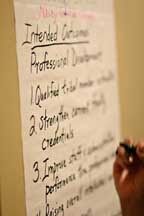Résumés

Why Create a Résumé?
You must create a résumé to apply for a job. This document is crucial to landing an interview (and should be perfect before sending to a potential employer).
What to Include in Your Résumé (in order of appearance)
- Résumés should be no longer than one page document, but if you have been in the workforce before, think strategically about organizing information that may exceed that page limit.
- Basic information– Name, current address, phone number (optional), and email. You may also list your tribal affiliation in this section, placed on top of the page.
- Objective– A brief statement of why you are creating this document and what you hope to achieve by sharing it.
- Education– List schools attended. Recent high school grads should list high school. Recent college grads should list college or university, degree, major, and GPA (optional).
- Experience – List previous jobs and internships. Include name of employer, job title, dates of employment, location (city and state), and responsibilities/achievements.
- Honors/Awards– List the awards and honors you received in and out school.
- References– Most interested employers will want references, but you do not have to include here. You may just add the phrase “References provided upon request.”
New to the Workforce?
- Consider adding sections for your skills outside of your job experiences, such as speaking a second language or technology skills and activities, such as clubs or sports, and leadership roles in and out of the academic setting.
- Ask a career advisor, faculty member, or working professional to review it and give critical feedback. This document is crucial to landing an interview and should be perfect before sending to a possible employer.
Different occupations have different styles of résumés.
Cover Letters
The cover letter, or letter of application, accompanies your résumé when applying for positions.
General Guidelines
- Customize each cover letter; match your skills and experience to the position.
- Identify the name and title of the person to whom the letter should be addressed. For online postings, include the name of the contact person and/or title that are listed.
- Remember, a cover letter may NOT be required for ALL online postings.
- For ads with no contact information, attempt to identify the organization. Only address the letter to “Dear Hiring Manager” if you are unable to find the necessary contact information.
- If the employer asks for salary requirements, always state them in a range and add that you are open to negotiation. Research salary figures for the position and geographic area.
- If an employer asks you for salary history, he or she is looking for consistency. Explain gaps or salary cuts in general terms.
- Your letter must be well written, free of errors, and grammatically correct. Do not overuse the word “I.”
- Read your letter aloud to ensure that your ideas flow and to catch any awkward sentences or overuse of words or phrases.
- A cover letter is NOT needed when handing your resume directly to an employer.
